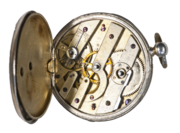| Part of a series on |
| Intelligent design |
|---|
 Watchmaker analogy Watchmaker analogy |
| Concepts |
| Movement |
| Campaigns |
| Authors |
| Organisations |
| Reactions |
| Creationism |
Ontogenetic depth is a pseudoscientific idea proposed in February 2003 by Paul Nelson, an American philosopher of science, young Earth creationist and intelligent design advocate; he is employed by the Discovery Institute.
Basically, Nelson concludes in his 'hypothesis' that developmental complexity is infrangible, and that if he shows Cambrian organisms to be complex, then it is therefore impossible for them to have evolved. Nelson proposes 'ontogenetic depth' as evidence of specified complexity, and a reliable marker of design by an intelligent agent, in opposition to modern evolutionary theory.
Nelson subsequently stated that ontogenetic depth is "Currently Impossible to Measure".
Criticism
Biologist PZ Myers, who works in the field of evolutionary developmental biology, dismissed the concept, stating in 2010 that "Nelson is a creationist who made up this wacky claim of "ontogenetic depth", saying he had a way of objectively measuring the complexity of the developmental process in organisms with a number that described the distance from egg to adult. Unfortunately, he forgot to tell us how one calculated this number, or how it actually accounted for the complexity of a network, or even how we'd get a number that was different for a sponge and a cat. But he did say he'd get back to us with the details tomorrow...six years ago." Myers concludes that "ontogenetic depth is a sloppily-defined concept with no theoretical support for its validity and no apparent operational utility."
The concept of 'ontogenetic depth' has not been published in any peer-reviewed journal, there are no methods described that would allow to measure this value in any organisms, nobody other than Nelson and his collaborator, Marcus Ross, do anything with the idea.
References
- Numbers, Ronald L. (2006). The creationists: from scientific creationism to intelligent design. Cambridge: Harvard University Press. p. 606. ISBN 0-674-02339-0.
- Nelson, Paul A.; Ross, Marcus (5 February 2003), "Ontogenetic Depth and the Origin of Animals" (PDF), ISCID Online Biology Chat Discussion Paper, retrieved 2011-03-27
- Paul Nelson (2003). "Ontogenetic Depth". ISCID Encyclopedia of Science and philosophy. Archived from the original on 2011-05-14. Retrieved 2011-03-27.
- Paul Nelson takes a stab at Ontogenetic Depth again…which makes me go stab-stab-stabbity-stab Archived 2014-04-08 at the Wayback Machine, by PZ Myers, at Pharyngula; published April 10, 2011. Retrieved April 7, 2014
- ^ PZ Myers. "Happy Monkey, Paul Nelson! It's been six years now". Pharyngula. Archived from the original on 2011-11-13. Retrieved 2011-03-27.
- PZ Myers. "Ontogenetic depth". Pharyngula. Archived from the original on 2013-10-22. Retrieved 2013-02-22.
External links
- Nelson, Paul (April 6, 2011). "Understanding Ontogenetic Depth, Part I: Naming Versus Measuring". Evolution News. Retrieved 23 February 2024.
- Nelson, Paul (April 7, 2011). "Understanding Ontogenetic Depth, Part II: Natural Selection Is a Harsh Mistress". Evolution News. Retrieved 23 February 2024.
This creationism-related article is a stub. You can help Misplaced Pages by expanding it. |